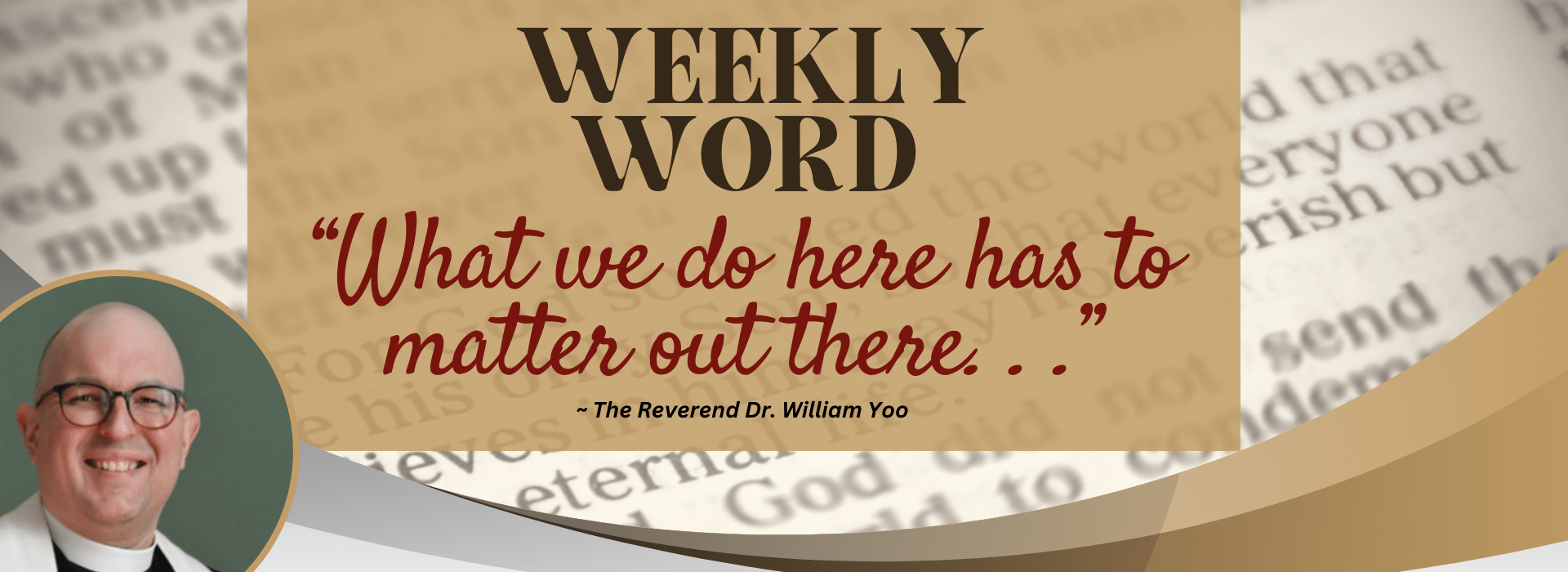This past week, I got a phone call from Marcia Morgan, a longtime member of BPC and current member of the Session. Marcia had flown down to Atlanta to attend the Presbyterian Church USA’s Matthew 25 Summit. This was a gathering of pastors, elders, and other folks who were talking, thinking, listening, and praying about the kind of church we need to be in the coming decades. The whole idea of the Matthew 25 Initiative in the PCUSA is how Jesus identifies with “the least of these” and how the church is called to follow his example in our life and ministry.
When Marcia called, she was excited. She said, “John, there was so much. . . So many ideas! So many things to think about that could have an impact on every aspect of our church! I’m going to have a hard time putting it into words.” I assured her that she will have time to unpack all that she learned and then share it with us.
One part of the Summit that Marcia shared with me was a lecture by The Reverend Dr. William Yoo, a church historian who teaches at my alma mater, Columbia Theological Seminary. Dr. Yoo shared the challenges that the church faces to promote religiously engaged citizenship – the tightrope that churches often walk between having the politics of congregants influence their religious life vs. having the religious life of congregants influence their politics. He related all of this to Matthew 25 because if Jesus identifies with the poor, or those who have been historically disadvantaged, people who represent racial minorities, and people who have been on the outside, looking in, if the church is to engage a world that has systems and structures that have historically kept people poor or disadvantaged, the engagement of these systems will likely cause some conflict. And churches don’t like conflict. But, as You said, “there is no change without confrontation, no progress without protest, and no discipleship without dissent.”
Yoo’s lecture was not a firebrand sermon calling the church to take it to the streets and burn the current system to the ground. He offered moments of great nuance – something that is normally sorely lacking in today’s discourse. In one portion, he said that discussions around white privilege should not focus on guilt but should focus on transformation of the world in which we live. We have inherited a world that is complex – full of both darkness and light – but with the Spirit’s help, we can “edit” the moral world that we see so that it more fully reflects the kingdom of God.
In a moment that made me smile, Yoo had a word of advice for congregations:
If you have a good pastor who’s visited you in the hospital, performed your relative’s funeral, presided while your daughter tied the knot, moderates the session and is present working with church members, “do not get angry when they preach for three minutes” on “a position you don’t agree with. Don’t change ‘my pastor’ into ‘that pastor.’ Even if you disagree with that position, you’re figuring it out too, and they’re journeying with you.”
Just so you know, this pastor appreciates being “your pastor” and not “that pastor,” and I hope that as we seek to be faithful to the message of Jesus, we can journey together and be changed by the Spirit, together.
If you would like to read more about the Matthew 25 Summit while Marcia Morgan – BPC’s Matthew 25 Elder – is traveling home, full of Holy hopes and dreams and ideas, click HERE for an article about Dr. Yoo’s lecture.
You can also watch the lecture by going HERE and fast-forwarding to the one hour, 18-minute mark.
As Dr. Yoo says: “What we do here has to matter out there.” May we live in such a way and God be at work within us in such a way that the Spirit makes it so. . .
See you in Church!
Grace and Peace,
John
Prepare for Worship
This Sunday: “When the Kingdom Takes Root” (Scattered Seeds and Fertile Soil)
- Read Psalm 126
- Read Mark 4:1-9
- Read Mark 4:21-34
- Read or sing Hymn # 308 – “O God in Whom All Life Begins”

